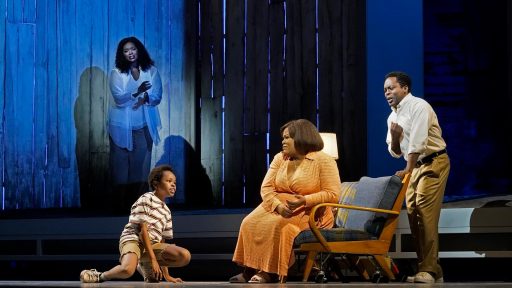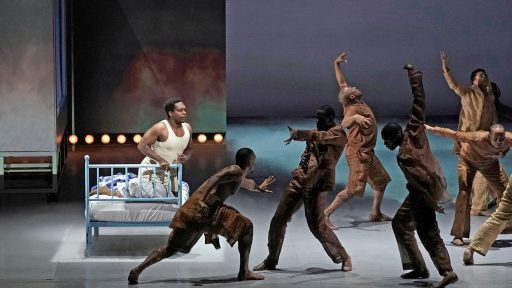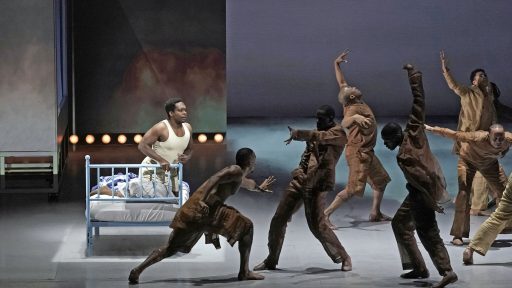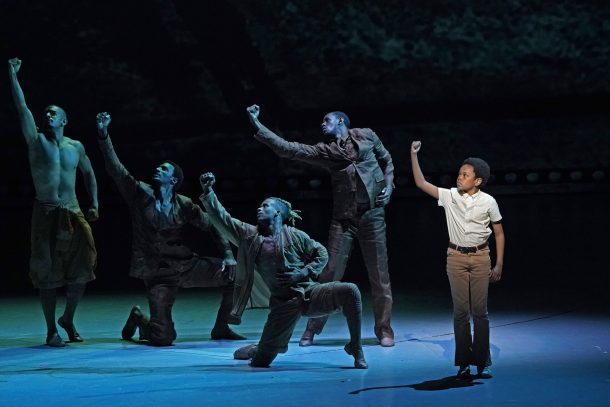
Walter Russell III and dancers in “Great Performances at the Met: Fire Shut Up in My Bones.” Photo courtesy of The Metropolitan Opera.
Season 16 of Great Performances at the Met continues with Great Performances at the Met: Fire Shut Up in My Bones, premiering Friday, April 1 at 9 p.m. ET on PBS (check local listings). The historic production marked the Met’s first performance of an opera by a Black composer, Grammy winner Terence Blanchard. Featuring a libretto by filmmaker Kasi Lemmons, the opera tells the story of a young man’s journey to overcome a life of trauma and hardship. James Robinson and Camille A. Brown co-direct this new staging, with Brown also choreographing, becoming the first Black director to create a mainstage Met production.
Baritone Will Liverman stars as Charles alongside soprano Angel Blue as Destiny/Loneliness/Greta with soprano Latonia Moore as Billie and Walter Russell III as Char’es-Baby. Audience members travel to 1970s and 1980s Louisiana, during Charles M. Blow’s childhood and early adult life.
Have you ever wondered what it’s like to compose a new opera? The WNET Group’s Jasmine Wilson chatted with Grammy-winning jazz musician and composer Terence Blanchard. Check out this special insider’s view to discover what it was like behind the scenes of this historic production.
*Responses have been edited for clarity.
- Jasmine Wilson: What drew you to Charles M. Blow’s story and to compose this opera?
Terence Blanchard: A friend of my wife told her about Charles’ memoir. Then my wife read it and told me about it. I think there’s an astonishing notion of knowing Charles as the brilliant journalist that he has been for a number of years and then understanding everything that he’s gone through as a kid. And to not have succumbed to any of that abuse– he’s actually thrived and triumphed– I think it is a very powerful story in itself.
I kept thinking to myself telling a story would be helpful to a lot of people who are going through this. It’s been an amazing experience because Fire has been doing exactly that. There was a gentleman who came to the show at the Met. He came up to me in tears and said, “Thank you for this because I’m a survivor.” It’s been a very, very, very powerful experience because of that. I think when people see the show, and they recognize who Charles is and what he’s done, it gives them the strength to persevere.
- JW: A standout group of people on the creative team helped make this opera happen, including an amazing librettist. Tell me what it was like to collaborate with Kasi Lemmons.
TB: She’s brilliant. I mean, that’s my sister, and I love her to death. She is so creative, so thoughtful, so just f*****g brilliant, you know. I knew she was the right person to write this libretto. Take, for example, the aria “Peculiar Grace.” That phrase is not in the memoir. It’s nowhere in the book; it’s something that Charles said to her in passing. He said, “I was a boy of peculiar grace,” and it stuck with her. She wrote this aria based on that. That’s just how brilliant she is.
I’m telling you, Kasi and I are kind of like birds of a feather. We’re both Pisces, and we’re both married to Libra. This is something we laugh about all the time, pretty hilarious, you know. But in another sense, there’s something about our working relationship that’s just unique. And you’re seeing the evidence of it in these words.
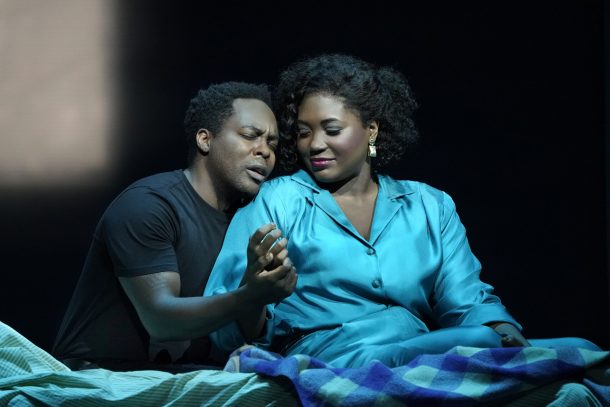
Will Liverman and Angel Blue in “Great Performances at the Met: Fire Shut Up in My Bones.” Photo courtesy of The Metropolitan Opera.
- JW: Of course, many people know you for jazz. They know you for the numerous film scores that you’ve done with Spike Lee. What were some of the influences or considerations you had in mind while composing the score?
TB: One of my favorite pieces is The Rite of Spring. You can hear Stravinsky’s Russian folklore and his Russian background throughout the entire thing. He doesn’t shy away from it. As a matter of fact, that’s the main DNA being used to create the piece. So that’s what I’m trying to do here.
I’m trying to take the harmonic progressions of a jazz composition, the orchestrations of Puccini, the church backgrounds of some of these vocalists and put those things together to create something that’s a little different. So we’re telling the vocalists, “Allow yourselves to be all of who you are, not just a portion of who you are, to sing an aria that was created 200 years ago. There’s a reason why you come from the church, or you come from R&B, or you come from jazz, and then you wound up here.” And for me, it’s like to bring all of those things to bear, to have an effect and to show people what modern opera should be.
It should be all-encompassing because it always was supposed to be entertainment for the masses, for people for the people, not just for a selected few. So if that’s the case, then the influences for these stories need to be everything that we’ve experienced in our culture.
- JW: What were some of the other ways that you included jazz into the score?
TB: Well, I mean, it’s like using it as a tool like any other thing. Sometimes the bass and the drums are playing a swing pattern underneath a fully implemented orchestration for an aria. Or sometimes, it’s just piano and bass, which is something you would hear in a jazz club. Then there are moments and transitions when we feature the guitar to give us a little flavor for the culture in Louisiana. Fire Shut Up In My Bones has allowed me to expand my vocabulary and to tell stories in a way that I think is typically American. I think that’s what makes this kind of unique.
When I started down this road years ago, there was a great conductor who said to me, “American opera needs to have some element of jazz.” That stuck with me, and that’s been part of my mission with this–to not divorce myself away from where I came. My composition teacher taught me that being a composer is about taking folklore and going and going deeper into it.
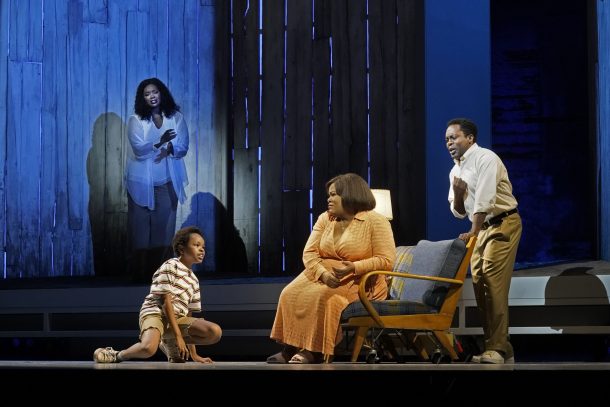
Angel Blue, Walter Russell III, Latonia Moore and Will Liverman in “Great Performances at the Met: Fire Shut Up in My Bones.” Photo by Ken Howard.
- JW: What is the role of faith in this work?
TB: It is huge. It’s the thing that gets them through. Charles’ mother says, “Sometimes, you just gotta leave it in the road. Lay your burdens down.” All of those things are because of the faith that you have in a higher power that can help you through these things. And the first thing you have to do is learn how to leave it in the road.
The first step to healing is to move forward, not to move in a circle, but to move forward. And that can only happen by understanding that there’s something better in store for you down the road. There’s healing that’s in store for you. I’ve been through enough. I’ve seen people go through enough. That’s kind of like my mandate about artistic endeavors now–they have to be a source of healing for all of us. We all have things that we need to go through and grow from. The first part of helping other people heal is to heal yourself.
- JW: What kind of healing can this opera offer people?
TB: Well, the thing that’s interesting about this is that it offers healing in a lot of ways. It’s an all-Black cast, and it takes place in our communities. But it’s a universal story. So by it being a universal story, it should make people who have biases against others understand that we’re all the same. We’re all trying to be loved. We’re all trying to get through the day and try to put as much sunshine on our faces. So that’s one thing to understand, that while this is a Black cast, this is not just a Black story. It is a universal story.
One of the major things that I hope will help people to grow is Charles’ reaction to the opera himself. When he first saw it in St. Louis, one of the things that he said was, “I realized that’s not me anymore.” And that’s powerful. I think when you bring all of those elements together, it can be a very healing thing for a lot of people.
And I think the most important thing for the opera world to realize is that this is a current story. This is not La Bohème, Turandot, Salome, which are great operas, don’t get me wrong. And they’re great because they’ve stood the test of time. But those stories were relevant from the time from which they were created. That’s what I’m trying to do with Fire Shut Up In My Bones, to take all of our culture and our folklore and put it into this forum to allow people to tell a story.
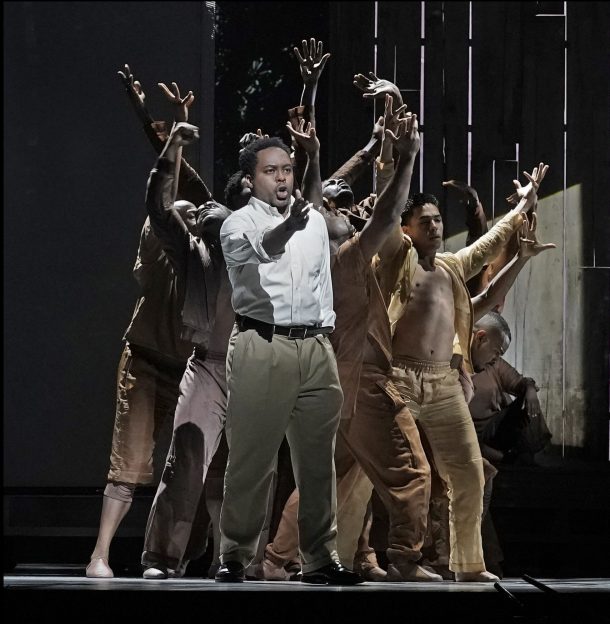
Will Liverman and dancers in “Great Performances at the Met: Fire Shut Up in My Bones.” Photo by Ken Howard.
- JW: What’s next for you?
TB: Well, The Met has announced that they’re going to do my first opera, Champion. The Met has also commissioned me to write another opera, which we haven’t determined our story yet. And then the Met is also bringing back Fire Shut Up In My Bones after they do Champion.
- JW: Is there anything else that you would like to share?
TB: I’m filled with gratitude for the entire thing. To have a production at the Met was filled with so much mixed emotions. Because you know, while I was the first, I know that I wasn’t the first qualified. I know that there are so many other people. The thing that I kept saying is, I don’t want to be a token, not at all. Let this be the thing that opens up the floodgates for everybody else to come in and tell stories.
To experience the full beauty of Fire Shut Up In My Bones, tune in to Great Performances at the Met on April 1 at 9 p.m. on PBS. Please be sure to check your local listings, as dates and times can vary widely across the country.


